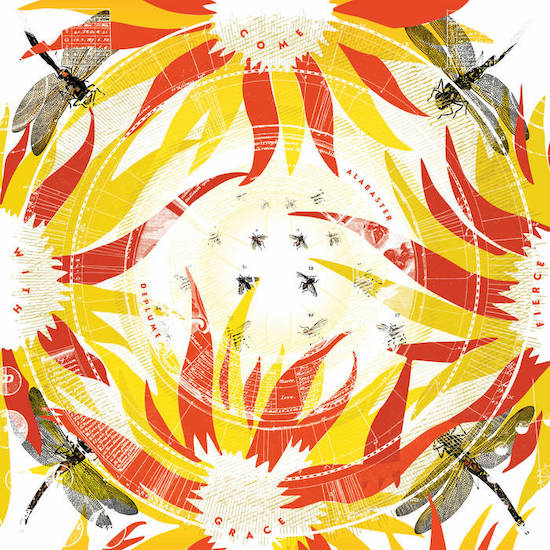Continuing a notably productive period, Alabaster DePlume is releasing Come With Fierce Grace, his fifth album in as many years. Taking its point of departure from leftovers from the recording sessions for 2022’s GOLD, Come With Fierce Grace has a similar energy to its elder sibling but takes a more stripped-back approach.
Though not a strictly instrumental album, there are fewer vocals on the whole than GOLD, and DePlume’s spoken word only makes two appearances. The composer and multi-instrumentalist, whose primary instrument is the saxophone, brings in other artists to fill in the gaps. Margate-based Guinean artist Falle Nioke opens the album with ‘Sibomandi’, his earthy voice providing a foil to the buzzing saxophone.
The percussion on the album is second only to the sax in terms of its presence. Rather than merely keeping a beat, the percussion has a propulsive quality, forcefully moving the songs forward. Some of the most compelling moments of Come With Fierce Grace are when it feels like the rhythm has fully consumed the song, for example, the saxophone lead of ‘Greek Honey Slick’ punctuating the drums and interplaying with a low-lying muted guitar.
The diversity of drums and percussion instruments and players also lends a different quality to the sound, bringing in a slapped, clacking flatness. It’s a perfect match to the frequently staccato energy of the saxophone.
While the higher energy tracks are more immediately recognisable, Come With Fierce Grace is filled with soft, lulling textures. The stretched-out shiver of ‘Fall on Flowers’ creeps in calmly, a ramshackle clatter of percussion in the distance picking up speed and encouraging the shift in the saxophone from a languorous vibrato to a muffled, tumbling refrain.
‘Not Even Sobbing’ has a low, aching tone countered by a wordless vocal that refuses to match that feeling of mourning. Long pauses that feel like time for the ache to set in on the first listen become space to breathe on repeated listens. That perceived ache dissipates on the following track, ‘The Best Thing in the World’, whose warbling strings and synths roll through a gently mesmerising repetition.
It’s late album track ‘Naked Like Water’ that acts as both thesis statement and outlier, both summarising the different atmospheres of the songs that precede it as well as something denser and akin to psych-jazz. Donna Thompson’s wordless vocals and exuberant yawps similarly traverse that spectrum from soothing to energising. It’s not the final word of the album – that goes to DePlume himself – but it’s still a neat encapsulation of all of its permutations of mood, tone, and arrangement.


